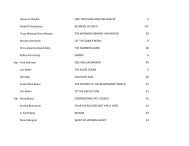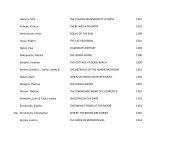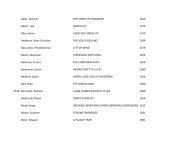nonfiction
nonfiction
nonfiction
Create successful ePaper yourself
Turn your PDF publications into a flip-book with our unique Google optimized e-Paper software.
CAINE’S LAW<br />
Stover, Matthew<br />
Del Rey/Ballantine (496 pp.)<br />
$16.00 paperback | Apr. 3, 2012<br />
978-0-345-45589-5<br />
Continuing the blended fantasy/science<br />
fiction adventures of Stover’s homicidal<br />
antihero (Caine Black Knife, 2008, etc.).<br />
If you’re unfamiliar with the Caine saga,<br />
the first 100 pages offer a rapid-shuffle blur<br />
of riotous confusion, but patient readers<br />
eventually will grasp that the near-future Earth is a disastrously<br />
overpopulated, caste-ridden dictatorship whose instrument of<br />
control is the dreaded Social Police. The downtrodden masses<br />
dream of escaping to Overworld, a planet accessible via advanced<br />
technology where magic works and fantasy tropes like dragons and<br />
elves are real. However, only Actors trained in violence and magic,<br />
equipped with “thoughtmitters” that beam back virtual-reality live<br />
access to their experiences, get to go there. Actor Caine, under<br />
multiple identities, has been making mayhem at his sponsors’ bidding<br />
for more than 50 years, battling gods, demons, enemies and<br />
friends alike. Perpetually bruised and battered, he survives only<br />
through healing magic and his indomitable will. When we first<br />
meet him, he’s a prisoner and crippled, about to receive an infusion<br />
of black-oil god-ichor. Eventually, however, he will meet the horsewitch,<br />
a mysteriously gifted immortal who remembers everything,<br />
even events that have “unhappened,” and whom various factions<br />
want to kill. The horse-witch, in passages of remarkable tenderness,<br />
helps Caine begin to understand the turmoil of conflicting<br />
impulses and rage that form his soul—and that, contrary to popular<br />
belief, what matters is not gods deserving of better people,<br />
but that people deserve better gods. And when he discovers that<br />
reality itself has been altered, he decides it’s time to make some<br />
changes of his own. Expect multiple plot threads that loop wildly<br />
and unpredictably between past and present, expletive-laden dialogue,<br />
havoc, torture and mass destruction. For starters.<br />
Brutal, witty, insightful, addictive, frequently baffling<br />
and altogether astonishing. (Agent: Howard Morhaim)<br />
RAGE OF THE DRAGON<br />
Weis, Margaret & Hickman, Tracy<br />
Tor (368 pp.)<br />
$25.99 | Apr. 24, 2012<br />
978-0-7653-1975-3<br />
Weis and Hickman (Secret of the Dragon,<br />
2010, etc.), co-authors of more than a<br />
dozen fantasy novels in the popular Dragonlance<br />
series and the seven-part Death<br />
Gate Cycle, among other works, again<br />
team up for the third book in their Dragonships<br />
of Vindras series.<br />
The story, which began with 2009’s Bones of the Dragon, continues<br />
as Skylan Ivorson and his Vindrasi warriors press on in their<br />
seafaring search for four of the fabled five Vektia spiritbones, in<br />
order to keep the insurgent Gods of the New Dawn from defeating<br />
Torval and the Old Gods. They again battle their treacherous<br />
enemy Raegar (who, like Skylan, has a magical dragonship with a<br />
summonable dragon) and tackle new dangers, including a monstrous,<br />
tentacled kraken. They also encounter the pacifist and<br />
matriarchal Aquin sea-people, who have built an impressive city<br />
deep inside a mountain. This entry offers few surprises, but the<br />
battle scenes are lively. It can be a bit plodding at times—particularly<br />
in a long section centering on the bland Raegar—and readers<br />
may wish for more dragon battles, or more world-building detail<br />
regarding the Aquins. But a late plot twist will leave fans of the<br />
series eager for the next entry.<br />
A middling fantasy adventure that will appeal mainly<br />
to the authors’ longtime fans.<br />
<strong>nonfiction</strong><br />
These titles earned the Kirkus Star:<br />
THE OCCUPY HANDBOOK by Janet Byrne ................................. p. 810<br />
FREEDOM’S FORGE by Arthur Herman .....................................p. 820<br />
DREAM NEW DREAMS by Jai Pausch .........................................p. 828<br />
WHAT MONEY CAN’T BUY by Michael J. Sandel ...................... p. 831<br />
ERNIE K-DOE by Ben Sandmel ..................................................... p. 832<br />
DREAM NEW<br />
DREAMS<br />
Reimagining My<br />
Life After Loss<br />
Pausch, Jai<br />
Crown Archetype<br />
(288 pp.)<br />
$24.00<br />
May 15, 2012<br />
978-0-307-88850-1<br />
JASMINE AND FIRE<br />
A Bittersweet Year in Beirut<br />
Abdelnour, Salma<br />
Broadway (304 pp.)<br />
$14.00 paperback | Jun. 5, 2012<br />
978-0-307-88594-4<br />
978-0-307-88595-1 e-book<br />
A food-focused travel memoir through<br />
the streets of Beirut.<br />
Although she fled Beirut as a child<br />
during the Lebanese civil war, food writer<br />
Abdelnour never forgot the city or the sense of longing she felt<br />
to return. Disgruntled by her inability to feel at home in America<br />
despite 30 years in the country, the author left her friends,<br />
career and love interest in New York City to spend a year in her<br />
parents’ Beirut apartment. She was determined to reconnect<br />
with her roots. Relatives and old friends who remained in the<br />
country during the war eased the transition from one city to<br />
the other. By taking daily walks through her old neighborhood,<br />
the author slowly felt the essence of Beirut sinking into her<br />
pores. Detailed street descriptions allow readers to meander<br />
with the author as she widens her berth, exploring new sections<br />
of the war-ravaged city. Abdelnour places special emphasis on<br />
the Lebanese food she ate on her walks or was served at one of<br />
the many family gatherings she attended. An expanding social<br />
circle of new friends and the ability to write about Lebanon<br />
helped her accept her background while maintaining her American<br />
identity. Despite the political unrest of the region, Abdelnour<br />
found peace in her new surroundings. Having embraced<br />
her Lebanese culture fully, the author realized she carried the<br />
sense of home inside her and ultimately returned to New York<br />
to live, at least for most of the year. Though the book includes<br />
recipes, a street map would have been a useful addition.<br />
Recommended for readers of food memoirs and those<br />
interested in Lebanon.<br />
806 | 15 april 2012 | fiction | kirkusreviews.com |<br />
| kirkusreviews.com | <strong>nonfiction</strong> | 15 april 2012 | 807






